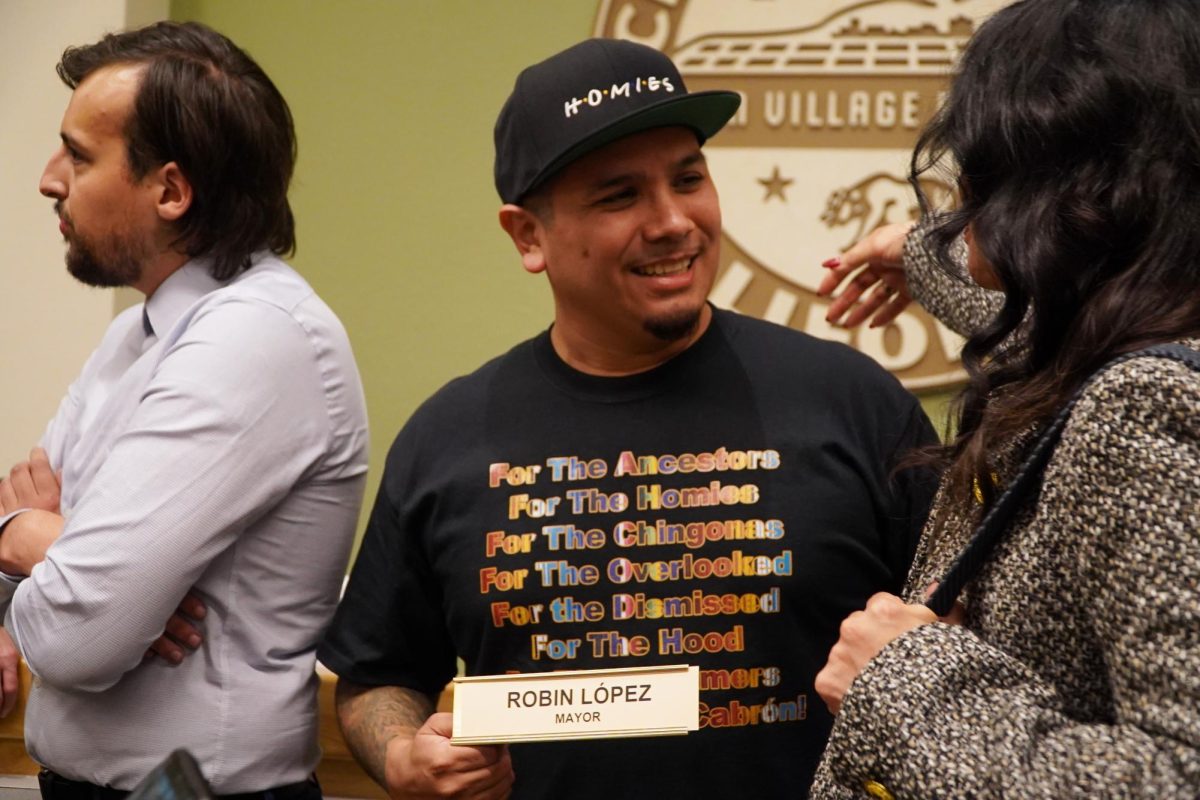Hundreds of people gathered Oct. 12 at Potrero Power Station for the 10th annual La Cocina Street Food Festival. The festival pushed for equity among women, people of color and immigrants in the restaurant industry.
More than 50 chefs and restaurants transformed a barren industrial lot into a bustling celebration of the diverse culinary terrain that reflects San Francisco food scene. The air was filled with savory aromas which entranced guests as they traveled throughout the space.

Pitmaster G-Stacks bastes barbeque on a spit at the 10th annual La Cocina Street Food Festival Oct.12. (Photo by MJ Johnson / Golden Gate Xpress)
“The goal of La Cocina at the end of the day is making sure that people can make a living doing the things that they love,” said Michelle Magat, Director of Communications and Development for La Cocina. “We do this in three ways: We provide affordable commercial kitchen space, provide technical assistance with marketing, finance, or operations, we also provide access to markets.”
La Cocina is a nonprofit organization born out of the desire to provide culinary entrepreneurs who were operating under and informal economy the opportunity to grow their business. La Cocina provides the bread and butter that entrepreneurs need to develop half baked ideas into reality. Guests who visit and support the street food festival are simultaneously supporting La Cocina’s mission.
Liliana Ramirez and Ricardo Cespedes are a married couple that own and operate Bocadito, a Colombian snackeria. Bocadito served oblea, a popular South American snack, with dulce de leche, blackberry sauce and whipped cream as toppings as well as Columbian coffee.
“We came here two years ago and immediately we applied to La Cocina with Bocadito, and they helped us make our dreams come true,” Ramirez said. “The best part is everybody [La Cocina entrepreneurs] came here with the same dream and we are here and proud.”
The festival allured guests with the promise of diverse flavors and vendors, but captivated them with their mission of bringing equity in an industry with lapses of opportunity and wage based on race and gender.
Micah Lewis was visiting San Francisco and chose to attend the festival because the small town in Texas where he lives doesn’t have events like this. He and his wife enjoyed eating fish sauce on grilled corn, tostadas and fried chicken.
“To see this many different cultures in one area is great and to see people mingling and getting along, everyone’s friendly and we’re loving San Francisco,” Lewis said.
La Cocina’s Street Food Festival was created because other food festivals were inaccessible to La Cocina entrepreneurs, as many don’t cater to street food.
It is much harder for women of color and immigrant women to enter the restaurant business. Despite over 50% of culinary school graduates being women, less than 23% of food businesses are owned by women, according to La Cocina’s Executive Dishwasher Caleb Zigas. La Cocina has become a catalyst for women to overcome institutional, systemic and intentional barriers that prevent them from entering the marketplace.
Alma Rodriguez is a mother of 3 who immigrated to San Francisco 15 years ago. Rodriguez grew her business, Mixiote, through La Cocina’s incubator program.
Mixiotes are traditionally marinated meat or vegetables wrapped in banana, plantain or avocado leaves, then cooked in their own juices. Rodriguez noticed mixiotes were sparse in the Mexican food scene of San Francisco. Her business was born from her desire to bring a dish from her home of Mexico City and share it in San Francisco.
La Cocina is about to have a lot more than food festivals on their plate. They are set to open a “Municipal Market” food hall on the Corner of Golden Gate Avenue and Hyde Street in the Spring of 2020. The focus of the food hall is affordability and creating space within the city that is accessible to everyone and will feature seven businesses.
“Over the last 10 years its gotten increasingly expensive to open a business in San Francisco. And we’ve found it harder and harder to place businesses which would be self sufficient in an affordable environment,” Zigas said, during a media tour at the food festival. “We will be opening what we understand to be the country’s first all women led food hall.”






